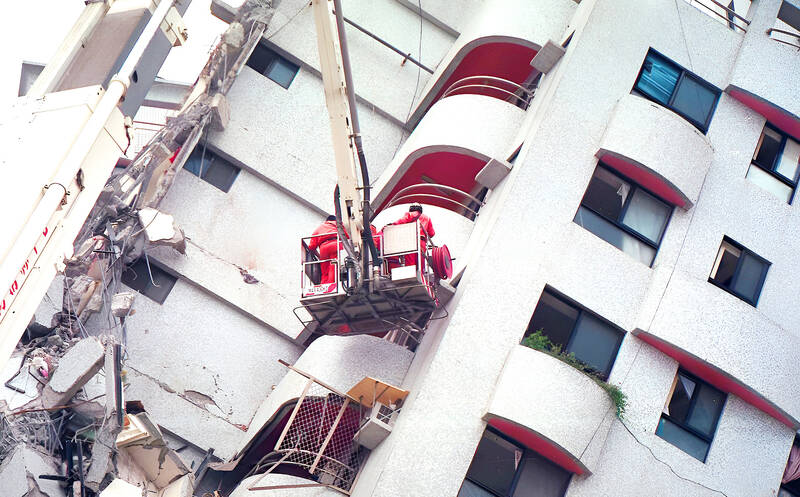對話 Dialogue
清清:你怎麼了?黑眼圈那麼重!
Qīngqing: Nǐ zěnmele? Hēiyǎnquān nàme zhòng!

Photo courtesy of Wikimedia Commons / 照片:Wikimedia Common 提供
華華:慘了!這麼容易就被看出來了!還不是地震害的!我怕得整夜都沒睡。
Huáhua: Cǎnle! Zhème róngyì jiù bèi kàn chūláile! Háibúshì dìzhèn hài de! Wǒ pà de zhěngyè dōu méi shuì.
清清:搖得很厲害嗎?我睡著了,完全沒感覺。
Qīngqing: Yáo de hěn lìhài ma? Wǒ shuìzháole, wánquán méi gǎnjué.
華華:天哪!你居然不知道昨夜有地震?你住幾樓?怎麼可能無感?
Huáhua: Tiān na! Nǐ jūrán bù zhīdào zuóyè yǒu dìzhèn? Nǐ zhù jǐ lóu? Zěnme kěnéng wúgǎn?
清清:昨天我可能太累了,倒頭就睡,天塌下來都與我無關。
Qīngqing: Zuótiān wǒ kěnéng tài lèile, dǎotóu jiù shuì, tiān tā xiàlái dōu yǔ wǒ wúguān.
華華:真羨慕你這種人!我家在十五樓,搖得像坐海盜船一樣,好擔心自己就看不到明天的太陽了!
Huáhua: Zhēn xiànmù nǐ zhè zhǒng rén! Wǒ jiā zài shíwǔ lóu, yáo de xiàng zuò hǎidàochuán yíyàng, hǎo dānxīn zìjǐ jiù kànbúdào míngtiān de tàiyáng le!
清清:今年的地震是比較頻繁,不過也不要太緊張,平常要準備好地震包,大地震來時,來不及跑就立刻趴下,躲在安全的地方觀察情況。
Qīngqing: Jīnnián de dìzhèn shì bǐjiào pínfán, búguò yě búyào tài jǐnzhāng, píngcháng yào zhǔnbèi hǎo dìzhènbāo, dà dìzhèn lái shí, láibùjí pǎo jiù lìkè pāxià, duǒ zài ānquán de dìfāng guānchá qíngkuàng.
華華:謝謝你啊!我希望我自己能做到這麼冷靜,學會跟這個避不開的天災和平共處。
Huáhua: Xièxie nǐ a! Wǒ xīwàng wǒ zìjǐ néng zuòdào zhème lěngjìng, xuéhuì gēn zhège bìbùkāi de tiānzāi hépíng gòngchǔ.
翻譯 Translation
Qingqing: What’s wrong with you? You have such dark circles under your eyes.
Huahua: Oh no! Is it really that obvious? It’s because of the earthquake: I was so scared that I didn’t sleep all night.
Qingqing: Was it really serious? I slept through it, didn’t feel a thing.
Huahua: Oh my! You didn’t even know there was an earthquake last night? Which floor do you live on? How could you not feel it?
Qingqing: Maybe I was just too tired yesterday, I fell asleep right away. Even if the sky fell down, it wouldn’t bother me.
Huahua: I envy people like you. I live on the fifteenth floor, it felt like being on a pirate ship, I was so worried I wouldn’t see the sun tomorrow.
Qingqing: Earthquakes have been more frequent this year, but don’t fret about it. Make sure you have an earthquake kit ready, and if a big earthquake hits, immediately drop to the ground and take cover in a safe spot so that you can assess the situation.
Huahua: Thank you! I hope I can be as calm as you. I want to learn to coexist peacefully with this unavoidable natural disaster.
生詞 Vocabulary
1. 地震 (dìzhèn) earthquake
2. 黑眼圈 (hēiyǎnquān) dark circles, to have bags under the eyes
3. 搖 (yáo) shake
4. 無感 (wúgǎn) numb
5. 倒頭就睡 (dǎotóu jiù shuì) [phrase] fall asleep immediately
6. 天塌下來 (tiān tā xiàlái) [phrase] sky falls down
7. 頻繁 (pínfán) frequent, often
8. 天災 (tiānzāi) natural disaster
教材音檔 Audio Files
國立清華大學華語中心提供
By National Tsing Hua University Chinese Language Center:

In today’s digital age, every click and swipe generates data, and the need for reliable and efficient data management has become critical. This is where data centers come into play. Data centers include servers, storage drives, networking equipment, and other hardware to manage, process, and store vast amounts of digital information. __1__ For that reason, some companies are pursuing an unusual idea: placing data centers under the surface of the ocean. What makes underwater data centers cheaper than traditional land-based ones? For one thing, the cool temperature of the ocean means that companies can cut down on the high cost of

A: Apart from BTS’ J-Hope and EXO’s Xiumin, Hong Kong singer Eason Chan is holding six concerts in Kaohsiung. B: And versatile British musician Jacob Collier is visiting Taiwan for the first time, performing in New Taipei City tonight. A: US singer Lauv and rock band LANY will also stage individual shows in Kaohsiung next week. B: Plus, Singaporean singer JJ Lin will hold two concerts at the Taipei Dome in early June. A: Which show are you going to? A: 除了BTS的J-Hope和EXO的Xiumin,香港歌王陳奕迅正在高雄熱唱6場。 B: 而多才多藝的英國歌手雅各柯里爾首度訪台,今晚即將在新北開唱! A: 美國歌手洛夫、搖滾樂團藍尼下週也分別在高雄演出。 B: 此外新加坡歌王林俊傑則將於6月初,首次挑戰台北大巨蛋嗨唱兩場。 A: 你想去聽誰的演唱會? (By Eddy Chang, Taipei Times/台北時報張迪)

US President Donald Trump on Monday last week signed the TAKE IT DOWN ACT (Tools to Address Known Exploitation by Immobilizing Technological Deepfakes on Websites and Networks Act), bipartisan legislation that enacts stricter penalties for the distribution of non-consensual intimate imagery, sometimes called “revenge porn,” as well as deepfakes created by artificial intelligence. The measure, which goes into effect immediately, was introduced by Sen. Ted Cruz, a Republican from Texas, and Sen. Amy Klobuchar, a Democrat from Minnesota, and later gained the support of First Lady Melania Trump. Critics of the measure, which addresses both real and artificial intelligence-generated imagery, say

1. 我不夠快。 ˇ I wasn’t fast enough. χ I wasn’t enough fast. 註:enough用作副詞時,一般放在它修飾的形容詞或其他副詞後面。例如: The tea is hot enough.(茶是夠熱。) He did not work hard enough.(他不夠用功。) 但enough用作形容詞時,前置或後置都可以。例如: There is enough food (/food enough) for us. 2. 今晚七時我們將開董事會。 ˇ We are having a board meeting at seven o’clock this evening. ˇ We are having a board meeting this evening, at seven o’clock. χ We are having a board meeting this evening at seven o’clock. 註:如果有多個時間副詞,一般單位大的放在單位小的後面。例如: I was born in May 1939. The meeting was held at five o’clock yesterday afternoon. 但如果大的單位是說話者強調的重點,則可以放在前面,但後面要有逗號,表示停頓。例如: He arrived yesterday afternoon, at about five o’clock. 3. 我生於麻州波士頓。 ˇ I was born in Boston, Massachusetts. χ I was born in Massachusetts, Boston. 註:一般而言,地點副詞的位置,範圍大的放在範圍小的後面。例如: Before